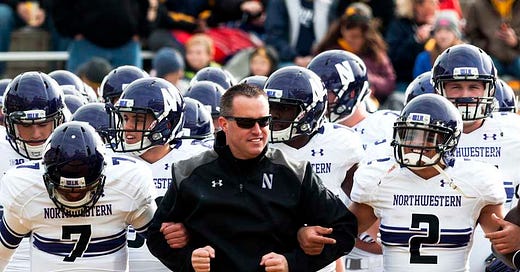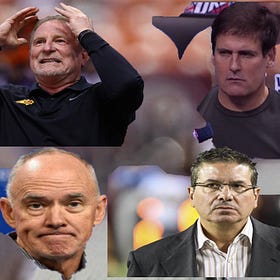Unions Are Good, IMO
Pat Fitzgerald, the winningest coach in the history of Northwestern football (which has a longer and slightly more illustrious football history than you might think — did you remember that Ara Parseghian, Lou Saban, and Dennis Green all coached at Northwestern?), was fired last week after details emerged from an investigation into the sexualized hazing that went on at the school during his long tenure. At first, the school just suspended Fitzgerald, but when some players came forward saying he may have known about what was going on, they reversed their decision and fired him.
The incident reminded me of the last time I really thought about Northwestern football: during the unionization push in 2014. In case you forgot, this started when former QB Kain Colter and 10 of his teammates tried to organize a players union, and even petitioned the National Labor Relations Board. They got as far as holding an actual vote, but the results of the vote were held up for over a year as the school appealed the NLRB’s decision, arguing that the players were not employees and thus ineligible for a union. Eventually the NLRB rejected the bid and the results of the vote were never made public.
At the time, this was covered mostly as part of the effort to get college athletes paid, which was gaining steam around that time: Taylor Branch wrote his landmark story, “The Shame of College Sports,” back in 2011. Unfortunately, ever since the Supreme Court has ushered in the era of NIL rights, which allows players to receive some compensation for the use of their Name Image and Likeness, much of the wind has gone out of the sails of the Pay College Athletes movement, But, as I’ve written before, NIL rights, while important, are really a poor substitute for paying college athletes for their labor.
To really fix the shame of college sports, student-athletes need a union, in part because unions are about more than just money. As this latest Northwestern scandal illustrates, college sports have more problems than just the lack of money for players. And unions are not just useful for getting paid more — they also help set the terms and manner of employment in a way that is fair for workers. In other words, they can help discourage things like this culture of “hazing.”
This might seem counterintuitive. After all, based on the details we know about the Northwestern scandal specifically, and these hazing practices in general, stuff like this is often perpetuated by fellow players. Coaches and management rarely acknowledge these kinds of things explicitly, even if they are aware of it and privately condone it. But the real abuse is carried out by other players, so how could a union of fellow players stop it?
The answer is that unions, and the process of collective bargaining in general, create explicit and clear rules that are meant to apply to everyone. Hazing thrives in hierarchical cultures, where the only rules are “unwritten” and ultimately up to the authority of the boss. This allows clearly abusive behavior to persist with winks and nods of approval from the people in charge.
That way, if it ever becomes public, the boss can say, “Well I didn’t know anything about this.” (Fitzgerald released a statement saying he was “not aware of the alleged incidents” in the report.) But it’s also clear to victims that they can’t report the abuse to anyone without fear of retaliation. (According to a player quoted in the The Daily Northwestern, “Everyone would just be looking at each other and be like ‘bro, Fitz knows about this’... Everyone joins in, because he’s the head coach.”) As the executive summary of the Northwestern investigation puts it, “While the investigation did not uncover evidence pointing to specific misconduct by any individual football player or coach, participation in or knowledge of the hazing activities was widespread across football players.” In other words, nobody did anything wrong, but somehow everyone knew about bad stuff going on.
If the Northwestern players had a union, that could provide the players with another outlet for reporting abuse. More importantly, it can impose rules on the boss himself, so that a coach like Fitzgerald can’t just look the other way because he doesn’t want to suspend his best player for an infraction like hazing, or because he secretly thinks hazing is a good way to teach kids. He has to follow the rules agreed to in the collective bargaining process.
This is part of why bosses hate unions, even apart from the money stuff. Indeed, Fitzgerald himself adamantly opposed his players’ efforts to unionize. Not because the money would come out of his pocket, but because he would lose his absolute authority. But as we’ve now seen, that authority comes at a painful cost.





